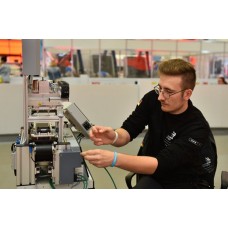Future Skills debuts at a WorldSkills
The Future Skills Competition is being held on the sidelines of the 45th WorldSkills Competition for the first time ever, featuring the skills of the future, in demand in the era of hi-tech production and the digital economy.
Future Skills is one of the priority initiatives of WorldSkills Russia having for its goal proactive training of the workforce for hi-tech production in a transforming economic environment.
WorldSkills Russia has been conducting relevant research to describe the professions demanded in the future, delivering competitions in new formats, and developing training courses to the WorldSkills standards aiming at ensuring international recognition of this range of skills.
In the speech addressed to an international media pool during the first day of WorldSkills Kazan 2019, the Deputy Prime Minister of Russia for Social Policy Tatyana Golikova underlined that Russia had been acting as an innovative contributor to the development of the WorldSkills movement in the country offering its own initiatives, among which was the Future Skills project.
She also expressed hope that WorldSkills Kazan 2019 would show the international community how valuable the innovations are to encourage other countries to take advantage of Russia’s experience in the next WorldSkills Competitions.
“The list of the Future Skills professions presented during the 45th WorldSkills Competition gives an insight into the next 10 years’ future,” notes Director General of the Young Professionals Union (WorldSkills Russia) Robert Urazov. “The robotics’ development impacts the economy and society greatly, eliminating existing jobs and creating new ones. Now, this process requires specific solutions rather than mere consideration”.
“By the Future Skills project, among other ones, we contribute to covering that risk. We are trying to understand the current processes and figure out what jobs will emerge, their number, and sectors. The country succeeding in forecasting what skills the future workforce should be taught will be on top of the world.
But it is fair competition, you can see that we are not secretive about our approaches and practices,” added Robert Urazov in reference to the World Economic Forum experts’ claims that the next 20 years will see about a billion of jobs vanishing.
The 25 Future Skills have been included in the program of WorldSkills Kazan 2019, but will be evaluated by 112 Russian and international experts separately from the main skills. Out of the 171 Future Skills competitors, 115 are on Team Russia with the rest representing 16 other states.
This first-ever Future Skills Competition will see among the competitors’ delegates from major Russian companies, university and vocational school students, as well as winners of national skills competitions. Their rivals from WorldSkills’ associations from other countries and regions are ready to take the challenge in the following skills:
…Building Information Modelling (BIM) (Belarus, Ireland, Singapore, and Poland), Drone Operating (Portugal, South Africa, China, and Singapore), Industrial Design Technology (China, Belarus, India, and Iran), Robot Systems Integration (China, Germany, and France), Mobile Applications Development (Kazakhstan, Iran, and China), and Industry 4.0 (China, Austria, Germany, and the Netherlands).
The Future Skills Competition is designed to demonstrate changes in skills and job functions of a modern specialist given the technology advancements. The competitors will be getting individual scores.
The Future Skills area at the WorldSkills Kazan 2019 is an interactive space where visitors can dive into the technology agenda of Russia and the world and navigate across the technology trends and skills of the future.




